

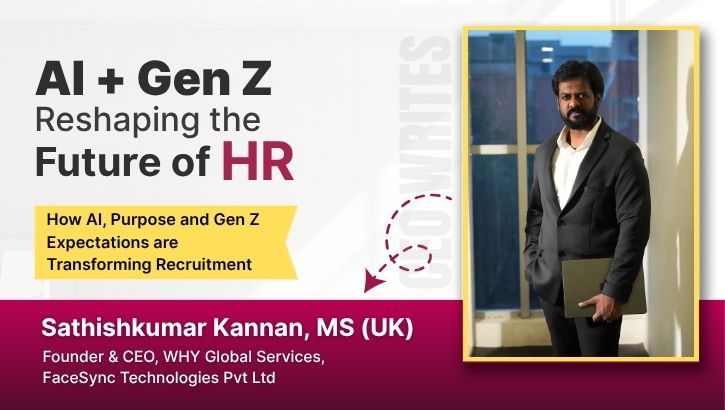
The workforce has changed and so have the rules. Studies reveal that 70% of Gen Z employees plan to leave their jobs within two years, while Artificial Intelligence is on track to reshape over 40% of HR functions by 2030.
For HR leaders, this is not a future problem, it’s a present crisis. Retention models built for Boomers and Gen X are collapsing. Recruitment cycles are shrinking, engagement feels harder to sustain, and loyalty has become a fleeting concept.
Take Aarav, a 23-year-old software engineer who walked away from a top IT firm in just six months. Not because of salary. Not because of workload. He left because he wanted purpose, growth, and flexibility things he couldn’t find in a traditional setup. Within weeks, he joined a startup where his ideas were valued, his learning accelerated, and his work had visible impact.
We now stand at a crossroads where technology and human expectations are pulling in opposite directions. AI promises efficiency, but Gen Z demands empathy. Algorithms can shortlist talent, but culture decides if they stay.
And so, the question HR leaders must ask is not “What’s coming next?” but rather: How do we build workforce models that survive and thrive in this new reality, where AI is the engine and Gen Z is the driver?
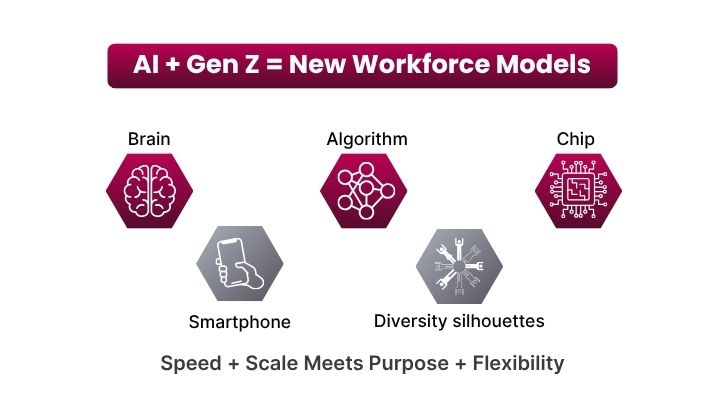
Every generation that has entered the workforce has left its mark, but the contrast today is sharper than ever before.
The result? A workplace where expectations don’t just differ, they often collide.
But this clash is not a weakness, it is a powerful opportunity. Each generation brings a unique strength:
The challenge and the opportunity for HR leaders lies in harmonizing these perspectives. The future will not belong to organizations that silence these differences, but to those that build cultures of coexistence where generational diversity becomes an engine of innovation.
| Generation | Strengths | Expectations | Challenges for HR |
|---|---|---|---|
| Gen X (1965–1980) | Experienced, pragmatic, resilient, independent | Stability, respect for expertise, leadership opportunities | May resist rapid tech-driven changes, prefer traditional structures |
| Millennials (1981–1996) | Tech-savvy, collaborative, adaptable, inclusive mindset | Work-life balance, career growth, inclusivity, hybrid models | Risk of burnout, desire for faster promotions, balancing flexibility with accountability |
| Gen Z (1997–2012) | Digital natives, innovative, entrepreneurial, socially conscious | Flexibility, purpose-driven work, real-time feedback, rapid career progression | High attrition, job-hopping, low tolerance for rigid hierarchies, demand for instant impact |
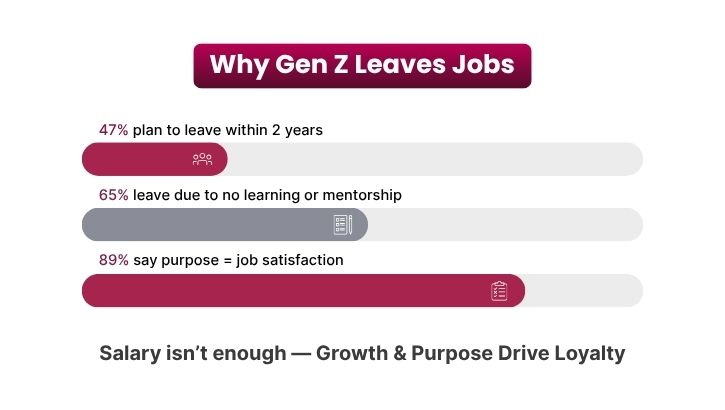
Pain Point 1: Recruitment in the Age of AI
Recruitment used to be a slow, human-intensive process. Today, AI has transformed it into a high-speed, data-driven system.
But there’s a caveat. Over-reliance on automation risks turning hiring into a cold, transactional process. Candidates especially Gen Z expect personalization. They want to feel seen, valued, and understood. If AI is the new engine of recruitment, empathy must be the steering wheel.
Pain Point 2: Retention Crisis: Gen Z is Redefining Loyalty
If there is one truth keeping CEOs and HR managers awake at night, it is this: retention is collapsing.
Gen Z doesn’t view loyalty the way previous generations did. For them, staying in one organization for five years isn’t a badge of honor, it’s a sign of stagnation. They move when growth slows, when flexibility isn’t respected, or when purpose is missing.
Retention strategies built for Boomers, pensions, long-term job security, rigid hierarchies, simply don’t work anymore. Even Millennials’ balance-oriented perks aren’t enough. Gen Z demands continuous growth, recognition, and purpose.
Pain Point 3: Engagement: From Transactional to Transformational
Engagement has long been measured by surveys, team outings, or performance reviews. But in 2025, those tools feel outdated.
For Gen Z, engagement is not about free coffee or annual bonuses. It’s about:
If engagement feels transactional, Gen Z will walk away. They expect workplaces to be platforms for personal growth and collective impact.
Pain Point 4: Technology + Ethics = Trust
The rise of AI in HR is both exciting and concerning. AI can help eliminate bias, accelerate recruitment, and personalize learning. But it also raises questions:
In a world where trust is the new currency, HR leaders must ensure that AI adoption is ethical, transparent, and people-first.
Rethinking Workforce Models: What Must Change
The old formula of “hire, train, retain” has run its course. In a world where AI is rewriting HR processes and Gen Z is rewriting workplace culture, leaders cannot rely on yesterday’s models to solve tomorrow’s problems.
The workforce of the future demands fluidity, personalization, and purpose. To thrive, HR leaders must embrace five critical shifts:
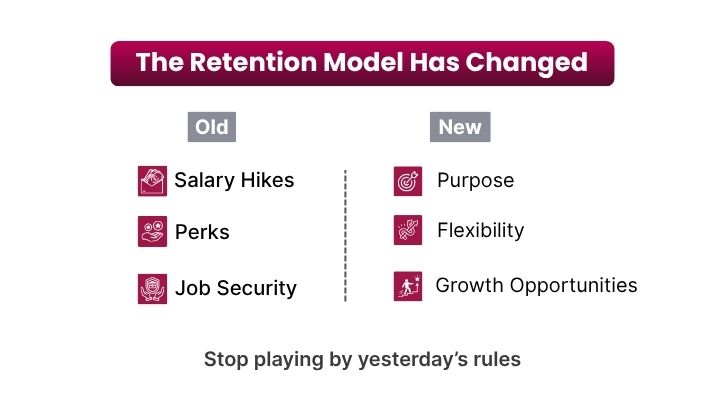
No two employees should walk the same path. With AI-driven insights, organizations can now map individual strengths, learning needs, and career aspirations. Pair that with human mentorship, and you get custom growth blueprints where employees see a future designed for them.
Example: A Gen Z employee doesn’t just want to know “what’s next” — they want to see a visible timeline of learning milestones, projects, and promotions aligned to their ambition.
Degrees are no longer career passports, skills are. The shelf-life of most technical skills is now less than 3 years. The only sustainable model is continuous learning:
Organizations that fail to embed upskilling into daily workflows risk losing talent to those who do.
Gen Z doesn’t want to fit into rigid molds. Hybrid schedules, gig-based contributions, side hustles, and portfolio careers are becoming the norm.
Instead of resisting, organizations must design policies that embrace flexibility while ensuring accountability. The future workforce will look less like a straight line and more like a network of overlapping opportunities.
Retention will not be won with perks like free food or foosball tables. True engagement will come from holistic well-being:
A thriving employee is not just more productive, they are also more loyal.
The workforce is multigenerational, multicultural, and multidimensional. The future will belong to leaders who can blend the strengths of every generation:
Inclusive leadership is not about age or seniority, it is about building cultures of coexistence where every voice shapes the future.
The CEO’s Call to Action
As leaders, our responsibility is clear: we cannot cling to old models and expect new results.
We cannot treat AI as a threat to HR, nor can we dismiss Gen Z’s demands as entitlement. The truth is, AI is here to empower, not replace. Gen Z is here to transform, not disrupt. Together, they represent the future of work: faster, smarter, more human, and more purposeful than ever before.
It is our duty to:
The organizations that succeed in the next decade will be those that stop asking “How do we manage employees?” and start asking “How do we design environments where people choose to belong?”
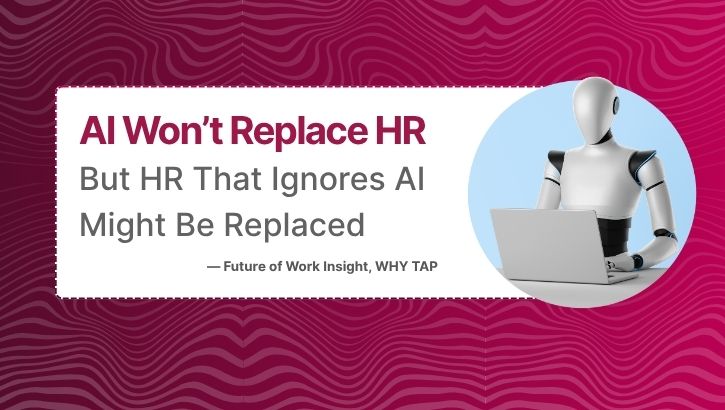
The future of HR is not about compliance. It is about co-creation.
The future of leadership is not about control. It is about trust.
And the future of work is not about survival. It is about building a thriving workforce where technology and humanity walk hand in hand.
Closing Note
At WHY Global Services, we have seen first-hand that when you align technology with human potential, extraordinary things happen. Gen Z doesn’t want jobs; they want journeys. AI doesn’t want to replace us; it wants to empower us.
The future of HR will not be about managing employees. It will be about designing ecosystems where people, technology, and purpose converge. And the leaders who embrace this truth today will be the ones shaping tomorrow’s workforce.